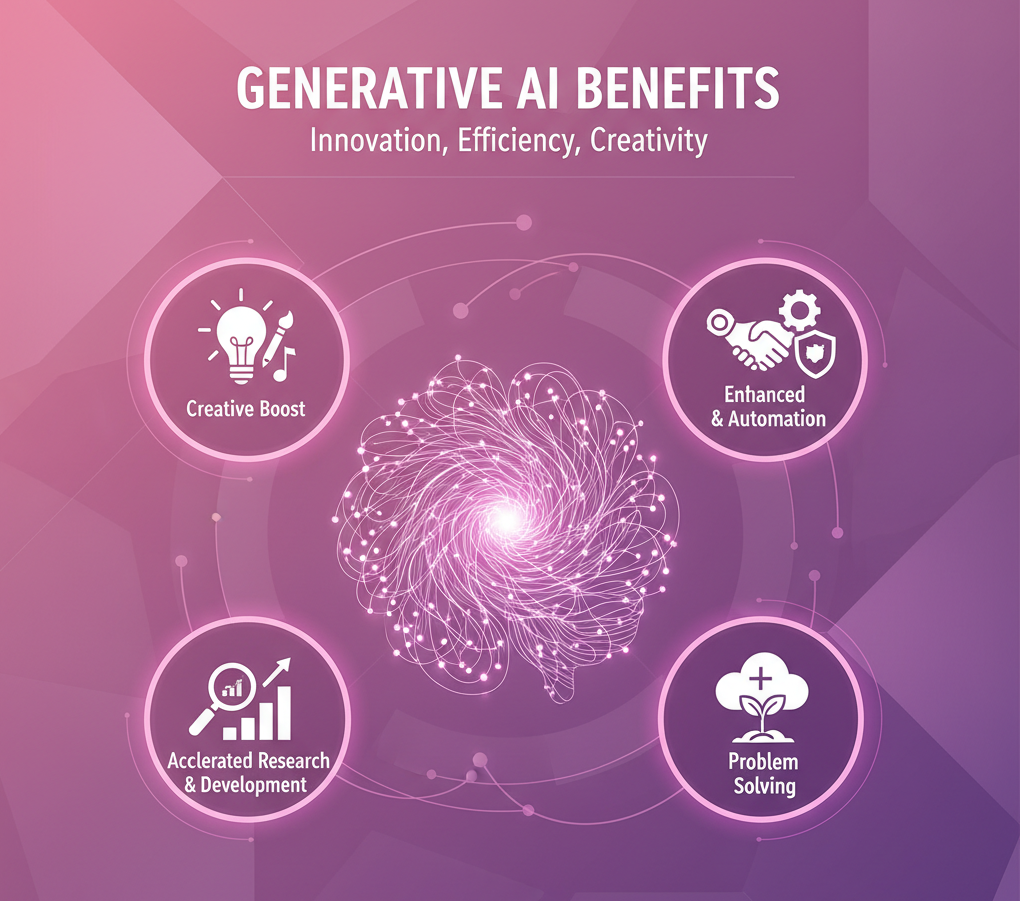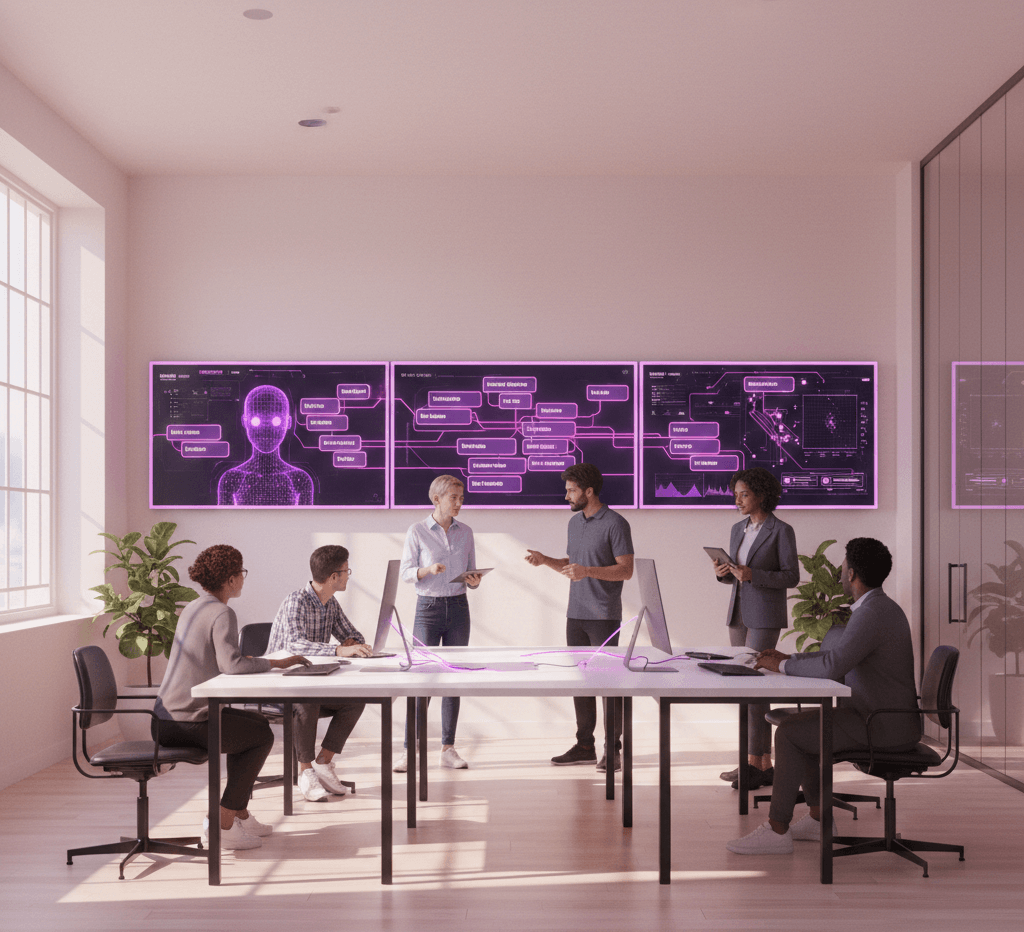“Explore the benefits of generative AI and how SalesCloser AI boosts sales through automation and personalization.”
In this article, we will share valuable and educational information that can help you understand essential concepts clearly. Generative AI is a revolutionary technology that is reshaping various sectors, enhancing creativity, and driving efficiency. We’ll delve into its core concepts, explore its benefits, and examine concrete examples across multiple industries. Towards the end, we will also introduce how SalesCloser works as a Generative AI tool for sales, demonstrating how its AI agents can enhance sales processes by making them more innovative and efficient.
What is Generative AI?
Generative AI refers to algorithms that can generate new content based on the data they have been trained on. Unlike traditional AI, which follows predefined rules, generative AI can create unique outputs, such as text, images, music, and even video. This capability unlocks endless possibilities for innovation and efficiency across various fields.
Benefits of Generative AI
1. Enhanced Creativity and Content Generation:
Generative AI can produce creative content at a scale and speed unattainable by humans. For writers, artists, and marketers, this means access to a tool that can brainstorm ideas, draft articles, create graphics, and design marketing materials in minutes.
2. Improved Personalization:
In marketing and customer service, personalization is key. Generative AI can analyze customer data to create personalized emails, product recommendations, and advertisements. This targeted approach increases engagement and conversion rates.
3. Time and Cost Efficiency:
Automating content creation and other repetitive tasks saves businesses time and reduces costs. For instance, generative AI can draft reports, write code, or even design products, freeing up human resources for more strategic tasks.
4. Data Augmentation:
Generative AI can generate synthetic data to augment real-world data sets. This is particularly useful in machine learning, where large volumes of data are required to train models. Synthetic data can fill gaps, enhance diversity, and improve the robustness of AI models.
5. Enhanced Problem Solving:
Generative AI’s ability to simulate different scenarios and generate solutions makes it a powerful tool for problem-solving. In industries like healthcare, finance, and engineering, generative AI can propose novel solutions to complex problems.
Real-World Applications & Examples of Generative AI
The impact of generative AI is already visible across major industries. Here are some of the most prominent examples of how it’s being applied:
1. Healthcare
In healthcare, generative AI is being used to develop new drugs by modeling complex molecular structures, a process that can accelerate drug discovery from years to months. It also enhances medical imaging, helping doctors detect diseases earlier, and personalizes treatment plans based on a patient’s genetic data.
- Example Tool: Insilico Medicine uses GenAI to identify novel drug candidates for diseases.
2. Finance
Generative AI assists financial institutions with advanced risk assessment, fraud detection, and informed investment strategies. By analyzing vast amounts of economic data, generative AI can identify subtle patterns and anomalies that signal fraud.
- Example Tool: Klarna’s AI-powered assistant handles the equivalent work of 700 customer service agents, resolving inquiries and providing personalized financial advice.
3. Entertainment and Marketing
The entertainment industry uses generative AI to create music, scripts, and stunning visual effects. In marketing, it powers content creation at scale.
- Example Tools: Midjourney and DALL-E 2 create photorealistic images from text prompts. Synthesia generates professional-quality videos featuring AI avatars, ideal for training and marketing purposes. Jasper and Copy.ai draft marketing copy, blog posts, and social media updates.
4. Software Development
Developers are utilizing Generative AI to automate writing and debugging code, significantly accelerating the development lifecycle.
- Example Tool: GitHub Copilot acts as an AI pair programmer, suggesting entire lines of code or even whole functions directly within the developer’s editor.
5. Manufacturing
In manufacturing, generative design software uses AI to create new product designs. Engineers can input constraints like weight, material, and cost, and the AI generates thousands of high-performing, lightweight design options that a human might never have conceived of.
6. Retail and E-commerce
Retailers use generative AI to enhance customer experiences through highly personalized recommendations, dynamic pricing, and targeted marketing campaigns. It’s also used to create virtual “try-on” experiences and design product mockups.

SalesCloser AI: Revolutionizing the Sales Industry
As we’ve seen, Generative AI has broad applications. Now, let’s examine a specific example from the sales industry. SalesCloser AI is a prime example of how generative AI can transform a particular process. This innovative platform leverages generative AI to power autonomous AI agents that enhance and automate the sales process, leading to increased efficiency and higher conversion rates.
Features of SalesCloser AI’s Agents
- Autonomous Lead Engagement: SalesCloser AI’s agents can independently handle initial lead interactions, qualify prospects, and answer common questions 24/7, ensuring no lead is left waiting.
- Personalized Outreach: The AI agents use generative AI to analyze prospect data and create highly customized emails, sales pitches, and follow-up messages. This tailored approach makes interactions more relevant and persuasive.
- Automated Follow-Up: Agents can execute complex, multi-touch follow-up sequences across various channels (email, SMS, etc.), ensuring persistent and timely communication that sales reps often lack the time for.
- Intelligent Data Analysis & Reporting: The platform’s AI provides detailed analytics on agent performance and prospect interactions. This helps sales teams understand what’s working and refine their strategies.
Benefits of Using SalesCloser AI
- Increased Efficiency & Productivity: By deploying AI agents to handle time-consuming, repetitive tasks like initial outreach and follow-up, SalesCloser AI frees up human sales teams to focus on high-value activities like closing deals and building strategic relationships.
- Higher Conversion Rates: With personalized, persistent, and immediate engagement, the AI agents ensure leads are nurtured effectively, increasing the overall likelihood of conversion.
- Data-Driven Insights: The analytics provided by SalesCloser AI enable sales teams to make informed decisions. By understanding performance metrics, teams can identify strengths and weaknesses and adjust their strategies accordingly.
- Scalability: SalesCloser AI allows businesses to scale their sales operations without a proportional increase in resources. The AI agents can handle a massive volume of leads simultaneously, enabling the company to grow without requiring a significant expansion of the sales team.
Conclusion
Generative AI is a game-changer in today’s digital landscape. Its ability to create, personalize, and optimize content and processes offers immense benefits, as seen in applications from healthcare and finance to software development.
Tools like SalesCloser AI exemplify how this powerful technology can be leveraged to revolutionize a specific industry. By deploying AI agents, it automates critical sales tasks, personalizes interactions at scale, and provides data-driven insights. As generative AI continues to evolve, its applications will only expand, unlocking new possibilities for innovation and efficiency. Embracing this technology can give businesses a competitive edge, drive growth, and transform their operations.
FAQs About Generative AI
What is generative AI?
Generative AI refers to algorithms that can create new content based on the data they have been trained on. This includes text, images, music, and other multimedia content.
How does generative AI work?
Generative AI works by learning patterns from existing data and then using that knowledge to generate new, similar content. Techniques such as neural networks and deep learning are commonly employed in generative AI.
What are the benefits of using generative AI?
Generative AI offers numerous benefits, including enhanced creativity, improved personalization, time and cost efficiency, data augmentation, and better problem-solving capabilities.
How does SalesCloser AI use generative AI?
SalesCloser AI uses generative AI to power autonomous AI agents. These agents enhance the sales process by automating lead engagement, generating personalized pitches, executing follow-up sequences, and providing performance analytics to drive sales.
Can generative AI be used in other industries?
Yes, generative AI is versatile and can be applied in various industries, including healthcare, finance, entertainment, manufacturing, and retail.
Is generative AI expensive to implement?
The cost of implementing generative AI can vary depending on the complexity of the application and the infrastructure required. However, the efficiency gains and potential revenue increases often justify the investment.
Are there any risks associated with generative AI?
Like any technology, generative AI comes with risks, such as data privacy concerns, the potential for biased outputs, and ethical considerations. It’s essential to mitigate these risks through effective governance and oversight.








